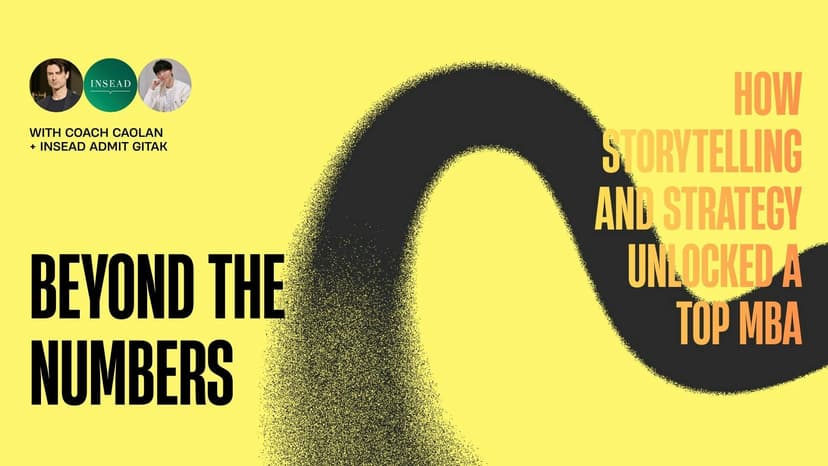How Early Should You Start the MBA Application Process?
The MBA application is an arduous affair that requires hours and hours of work. Here are six reasons why you should start the process as early as possible to maximize your chances of admission.
By Lauren W.
I coach prospective MBAs in crafting a story and apply for top MBA programs
Posted June 13, 2025

Join a free event
Learn from top coaches and industry experts in live, interactive sessions you can join for free.
The MBA application process is an enormous undertaking that requires hours and hours of work. But, this is for good reason. The two years spent at business school will majorly affect the rest of your career. This does mean, however, that your application timeline is very important. Though it differs drastically from applicant to applicant, generally, you should start yours as early as possible.
If you're a typical MBA applicant, you're probably planning on starting your MBA application in the summer of the matriculation year. That summer would be spent studying and preparing for the GMAT/GRE, and then the fall on the applications themselves–essays, letters of recommendation, resumes, etc.
However, to give yourself the best chance for the M7 or even the top 20 MBA programs, I highly recommend starting long before this. This isn’t always possible with personal or work schedules, but where it is, you’ll find it much easier to put together and submit a compelling candidacy.
Here are six reasons why earlier is better when it comes to MBA applications:
1. You can get the best possible GMAT/GRE score.
Let's be real, no matter who you are or how well you've done academically or professionally, the GMAT/GRE is one of the biggest stressors of an MBA application. Prep time is incredibly underestimated and most people end up studying for much longer than they had originally anticipated.
Many people put off studying until the summer, thinking the three months will be adequate time to reach that magic 700. However, those three months quickly turn into six or even a year–thus leading to a very, very stressful application season.
Furthermore, the applications are only getting more competitive, so it's crucial to try and get the best possible score. For many of the M7 programs, that’s now above a 700 on the GMAT (163/164 on the GRE). So, how does one even get to that coveted score? By giving themselves enough time to study.
Since GMAT/GRE scores are valid for five years, this is something that you can start early on, far in advance of when you actually submit the applications. Whether you're taking classes, working with a tutor, or studying on your own, giving yourself more time to prep for the test than you think you’ll need will never be a detriment. That way, when the time comes to work on the actual application, you only have to focus on your narrative.
2. Crafting a narrative for the application takes time.
While international business schools tend to more heavily weigh work experience in admissions decisions, MBA programs in the US love getting to know applicants on a deeper level. Thus, essays are a crucial portion of the application. They want to understand who you are, how your experiences have shaped you, and how you'll be an emotionally intelligent leader. In short, they want a good story.
This story has to have depth, showing (vs. telling) reflection and self-awareness, while also connecting with the reader. For most applicants, this takes time as not only are you forced to delve deep into yourself, but you have to be able to communicate it in an eloquent and persuasive manner.
For almost all of my clients, this is a process that takes months. As you work through your essays, you discover and unpack aspects of your candidacy that you hadn’t originally thought of, making the story (and your application) that much deeper. The applicants who start working with me earlier tend to have much higher success rates than those who are rushed.
3. You can apply to Early Decision/Round 1 deadlines.
For the many candidates who aim to use the summer to study for the GMAT/GRE, and then find that extending into the fall, the application often gets pushed to Round 2 or even 3. While there is nothing wrong with applying for Round 2 or 3, Round 1/Early Decision typically yields the best results. This isn’t just opinion – data has shown that the acceptance rate is slightly higher for R1, especially at the most prestigious schools.
By applying for Round 1, you also give yourself the added advantage of a second chance in R2. If you’re waitlisted for R1, you have time to improve your application and provide meaningful updates in the same application year. Again, there’s nothing wrong with applying for R2, but it is the most heavily applied to round so competition is stiffer.
Some programs offer Early Decision, which can substantially boost your chances as it shows you’re committed to the school. If admitted, you’re locked into that school but if it’s a top choice, then it’s often worth it to apply during this round.
4. You avoid the stress of holidays.
With most Round 2 deadlines landing around early January, most people think that they can use their Christmas break/holiday to crunch out applications. But remember, holiday times are stressful. Between Christmas and New Year’s Eve, time goes by much faster than expected, especially with family and social obligations. As an admissions coach, my schedule gets slammed with clients trying to do three or even five applications in the next month. You don’t want to be the person working along on NYE while your friends are all out celebrating the new year.
5. Recommenders have more time to write stellar letters of recommendation.
Another critical component of your MBA application is the letters of recommendation. Top MBA programs value diverse perspectives and experiences, so having strong recommenders who can truly attest to your strengths, leadership abilities, and growth potential is essential. Starting your application process early not only allows you to identify and connect with potential recommenders, but also gives you ample time to cultivate those relationships, ensuring that they understand your goals and can provide a meaningful endorsement. Remember, recommenders are often busy professionals themselves, so giving them sufficient time to thoughtfully craft their letters will demonstrate your respect for their time and commitment to your success. Ultimately, an early start will help you secure powerful recommendations that will make your application truly shine in the eyes of the admissions committee.
6. It leaves space for editing and other last-minute stressors.
Last-minute stressors always come up. Many of my clients have run into trouble submitting standardized test scores, getting their academic records to the school, or realizing they had unanswered sections. For others, it was simply not enough time to properly incorporate edits, fully flesh out a narrative, or comprehensively complete the short-answer questions.
By starting your application earlier, you give yourself a solid buffer for any of these last-minute hiccups. My most successful applicants typically plan to submit the application a week in advance of the deadline and by doing so, are able to avoid any issues.
Applying for MBA is a process and as with all processes, things don't always go as planned. To prepare for things not going as planned, it's necessary to give yourself enough time to organize, pivot, and adjust. Though I recognize that it isn’t always possible, when it is, apply early.
If you’d like to start working with me on anything related to the MBA application process–whether that be planning your timeline, finding your story, or anything else, head to my Leland profile. I’d love to help you get into your dream school.
Written by Lauren
5.0
(8)
Hi, I am Lauren Wong and I am a passionate and adaptive Goals and Manifestation Coach. As someone who has always thrived in setting and reaching their own goals, as a Goals Coach, I use my experience and skills to empower individuals to set and achieve their goals and create fulfilling and purpose-driven lives. Although I got my certification in coaching and launched my coaching business just recently in 2022, I've had extensive experience in mentoring and have been helping individuals achieve their goals as a private academic tutor for 9+ years and an undergrad mentor for 3+ years. Recently, I was certified by AIGAC, the premier international graduate admissions consulting organization. In the last 3 years my top achievements for MBA and Masters Admissions include: -Clients admitted to top MBA programs across the USA and Europe, including elite M7 and top 10 schools such as Wharton, Columbia, Kellogg, Haas, Ross, and Duke Fuqua, as well as leading European programs like INSEAD (100% acceptance rate), LBS, and HEC -85% of my clients admitted to at least one top 25 program—more than double the global average of 35% -100% of clients interviewed, waitlisted, or admitted—a track record of ensuring every client remains competitive -Over $500,000 in scholarships secured (including one full ride), helping clients realize their dreams with significantly reduced financial burdens -Collaborations with clients & AdCom across 5+ countries More importantly, my unique approach helps my clients discover, own, and communicate their story, building their skills and confidence needed to succeed in all endeavors! My coaching/mentoring journey began in 2014 when I started tutoring part-time. I'd continue tutoring and mentoring while working full-time until in 2021, after deep reflection during 2020 Covid times and a life changing trip to Taiwan, I realized that coaching was my true life passion. I embraced my natural ability in coaching and supporting others and assisted my local Taiwanese friends in their application to Graduate school in the States -- feeling truly fulfilled when I was able to help them get accepted to their dream program. So in 2022, I launched my coaching business, utilizing my tutoring and mentoring experience, along with my Bachelor degrees from UC Berkeley and MBA from UCLA Anderson, to help individuals reach their goals in the form of higher education and admissions. Since my launch I've helped clients get accepted into top MBA and masters program including UC Berkeley Haas, USC Marshall, Duke Fuqua, Kellogg, Ross, UCLA Anderson, INSEAD and more! As a coach, I work with my clients on delivering concrete results by providing support, edits, and feedback on clients' application. I also prioritize developing my client's confidence, empowering them with sustainable habits to help them set and reach goals, beyond just academics.
Lauren has helped clients get into organizations like:





























